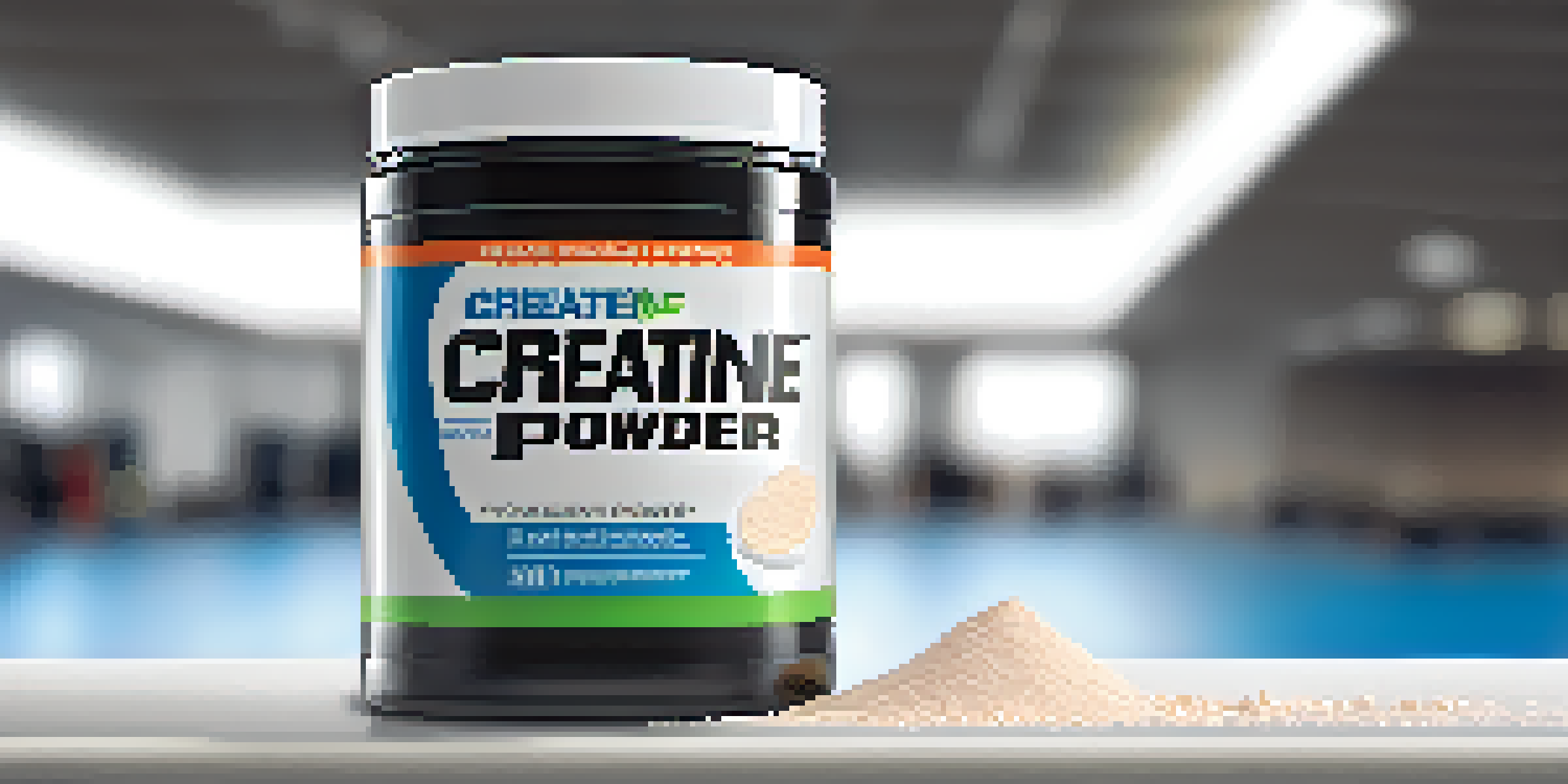Creatine: Boosting Performance and Muscle Recovery

What is Creatine and How Does It Work?
Creatine is a naturally occurring compound found in small amounts in certain foods and synthesized in the body. It plays a crucial role in the production of ATP, the energy currency of our cells, especially during high-intensity activities. When you supplement with creatine, you're essentially boosting your energy reserves, allowing for improved performance during workouts.
Creatine is the most researched sports supplement available and can help enhance performance in the gym and on the field.
Think of creatine like a turbocharger for your muscles. When you're at the gym or engaging in any strenuous activity, having that extra boost can help you push through those tough sets. This is why many athletes incorporate creatine into their routines, aiming for that enhanced edge in performance.
Moreover, creatine is not just for bodybuilders or elite athletes; it's beneficial for anyone looking to improve their physical performance, whether it’s in sports or general fitness. Understanding its functionality can help you make informed decisions about your supplementation.
Benefits of Creatine for Athletic Performance
One of the most well-documented benefits of creatine is its ability to enhance strength and power output. Studies have shown that athletes who supplement with creatine can lift heavier weights and perform better in high-intensity interval training. This translates to more effective workouts and better results over time.

Additionally, creatine supports muscle endurance, allowing you to sustain efforts for longer periods. Imagine being able to complete that last rep or sprint just a bit faster; this is the difference creatine can make. It’s like having a secret weapon in your fitness arsenal.
Creatine Boosts Athletic Performance
Supplementing with creatine enhances strength, power output, and muscle endurance during high-intensity workouts.
Furthermore, creatine may also contribute to improved recovery times between workouts. By reducing muscle soreness and inflammation, it helps you bounce back faster, allowing for more frequent training sessions and ultimately better progress.
Creatine and Muscle Recovery: What to Know
Beyond performance, creatine is also known for its muscle recovery benefits. After an intense workout, your muscles need time and resources to repair and grow. Creatine helps in this process by enhancing the availability of energy to muscle cells, making recovery more efficient.
Supplements like creatine can help athletes push their limits and reach their performance goals more effectively.
Imagine your muscles as a sponge that needs to absorb water after being squeezed dry. Creatine helps that sponge soak up nutrients and recover quicker after being put to the test. This means less downtime and more time spent on your fitness goals.
Additionally, creatine has been found to reduce markers of muscle damage after exercise, suggesting that it can help minimize the wear and tear from strenuous activities. This protective effect is essential for anyone looking to maintain a consistent workout routine.
How to Supplement Creatine Effectively
When it comes to creatine supplementation, timing and dosage matter. Many experts recommend a loading phase, where you take higher doses for the first week, followed by a maintenance dose. This approach saturates your muscles quickly, ensuring you’re ready to maximize your workouts.
A common regimen is to consume about 20 grams of creatine daily during the loading phase, followed by 3-5 grams for maintenance. It’s like filling up your gas tank and then keeping it topped off, so you’re always ready to go when it’s time to train.
Supports Faster Muscle Recovery
Creatine aids in efficient muscle recovery by increasing energy availability and reducing soreness after intense exercise.
Remember, staying hydrated is also crucial when taking creatine, as it draws water into your muscles. Pairing creatine supplementation with a balanced diet and proper hydration will help you reap the full benefits of this powerful compound.
Choosing the Right Type of Creatine
With various forms of creatine available on the market, it’s essential to choose the right one for your needs. Creatine monohydrate is the most researched and commonly used type, known for its effectiveness and affordability. It’s a great choice for anyone just starting with creatine supplementation.
Other forms, such as creatine ethyl ester or buffered creatine, claim to offer better absorption or fewer side effects. However, research backing these claims is limited. It’s like choosing between a well-known classic and a trendy new option; sticking with what works is often the best approach.
Ultimately, the best type of creatine is one that fits your lifestyle and goals. Stick to reputable brands and consult with a healthcare professional if you're unsure which option is best for you.
Common Myths Surrounding Creatine Use
Despite its popularity, creatine is often surrounded by myths and misconceptions. One common myth is that creatine is a steroid or unsafe for long-term use. In reality, creatine is a natural substance, and numerous studies have shown it to be safe for healthy individuals when taken as directed.
Another myth is that creatine causes weight gain solely due to water retention. While it’s true that creatine can lead to an increase in water weight initially, this is often temporary and can contribute to muscle growth over time. Think of it as an investment; some initial weight can lead to better muscle gains down the line.
Choose the Right Creatine Type
Selecting the most researched form, like creatine monohydrate, ensures effectiveness and supports your fitness goals.
Educating yourself about creatine can help dispel these myths and provide a clearer understanding of its benefits. Trusting in science and accurate information is vital when considering any supplementation.
Conclusion: Is Creatine Right for You?
In conclusion, creatine can be a powerful ally in your pursuit of better athletic performance and muscle recovery. It offers a multitude of benefits, from enhanced strength to quicker recovery times. However, like any supplement, it’s not a one-size-fits-all solution, and it's essential to consider your personal fitness goals and needs.
Before starting any new supplement regimen, it’s a good idea to consult with a healthcare professional or a nutritionist. They can provide personalized insights and help you determine if creatine aligns with your specific fitness objectives.

Ultimately, if you're looking to boost your workout results and accelerate your recovery, creatine might just be the missing piece in your fitness journey. As with any supplement, staying informed and making educated choices will lead to the best outcomes.